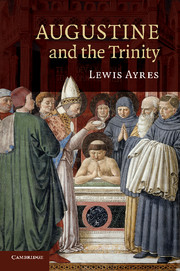Book contents
- Frontmatter
- Contents
- Acknowledgements
- List of abbreviations
- Introduction
- Part I Origins
- Part II Ascent
- Part III Into the mystery
- Part IV Memory, intellect and will
- 11 ‘But it's not fur eatin’ …'
- 12 ‘… It's just fur lookin’ through'
- Epilogue: Catching all three
- Bibliography
- Scripture index
- General index
- References
11 - ‘But it's not fur eatin’ …'
Published online by Cambridge University Press: 06 December 2010
- Frontmatter
- Contents
- Acknowledgements
- List of abbreviations
- Introduction
- Part I Origins
- Part II Ascent
- Part III Into the mystery
- Part IV Memory, intellect and will
- 11 ‘But it's not fur eatin’ …'
- 12 ‘… It's just fur lookin’ through'
- Epilogue: Catching all three
- Bibliography
- Scripture index
- General index
- References
Summary
Our greatest protection is self-knowledge, and to avoid the delusion that we are seeing ourselves when we are in reality looking at something else. This is what happens to those who do not scrutinize themselves. What they see is strength, beauty, reputation, political power, abundant wealth, pomp, self-importance, bodily stature, a certain grace of form or the like, and they think this is what they are. Such persons make very poor guardians of themselves: because of their absorption in what is foreign to them, they overlook what is proper to them and leave it unguarded.
INTRODUCTION
In this chapter and the next I turn to what is frequently taken to be the central and distinctive contribution of Augustine to Trinitarian theology, the attempt in the latter books of the De trinitate to illustrate some of the key principles of Trinitarian doctrine through analysis of triadic structures in the human mens. I do not aim here to offer a comprehensive interpretation of De trinitate 8–15 as a whole, nor even a reading that gives a full picture of Books 8–10 alone. I wish only to draw out the central lines of argument pursued through Books 9 and 10, adumbrated in Book 8 and reprised in Book 14. At the end of this investigation I will suggest the reasons behind his deployment of memoria, intellegentia and voluntas in Book 10.
- Type
- Chapter
- Information
- Augustine and the Trinity , pp. 275 - 296Publisher: Cambridge University PressPrint publication year: 2010



